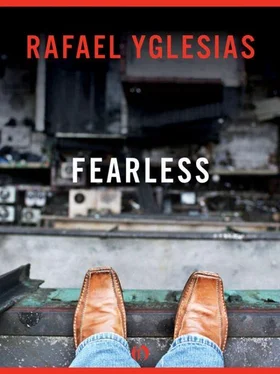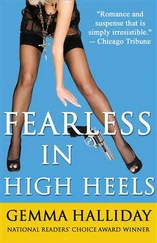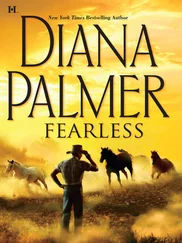That’s why Jeff had been killed. God had severed his head for his small-mindedness and he deserved it too and there was nothing to feel bad about.
“I didn’t save anybody,” Max said to the reporter, pissed off that they were presenting him to the public as a hero.
It had begun the night before, without his knowledge, after he got back from delivering his bad news to Nan. He had been home five minutes when Byron’s parents phoned to say the boy needed to see him. Byron’s father had gotten his number through somebody who knew somebody at TransCon. He introduced himself as Peter Hummel and apologized for the intrusion but explained that his son was still in a state of terror, unable to sleep or eat. What Byron demanded over and over was to be with the man who saved his life. Naturally Max agreed to their request that they bring him by.
Again Debby was annoyed, now at the late hour (it was past eleven at night) as well as by Max’s willingness to give up time with her for others. She wouldn’t admit that was the reason; she claimed she was thinking of Max, that he needed to rest. He had just gotten home from Nan’s, she pointed out; he had not had a minute to himself.
“Dr. Perlman said you need peace and quiet,” she said. Max laughed. Debby flushed, embarrassed. “You’re laughing at me.”
“I’m sorry, but that sounds ridiculous.”
“Don’t you want to be left alone?” Debby demanded.
“When did you talk to Dr. Perlman?”
“He called while you were at Nan’s. He’s nice. He’s trying to help.”
Max shook his head, dismayed by her eagerness to accept help without studying the giver’s motive. That was her vulnerable point. The back injury that threatened and eventually ended her fledgling ballet career was his prime example: she was too willing and too grateful to Max for nursing her through her attempted comebacks and finally comforting her over the death of her ambition. You’re so kind, she used to say. Actually he had been full of lust and selfishness. “Perlman is around to make the airline seem compassionate,” Max told her. “He’s paid to be nice.”
There was only half an hour to argue about it, or rather to sulk (Debby disappeared to take a bath), since Byron and his parents lived in Greenwich Village and were leaving immediately. Max went into Jonah’s room. He was still awake, lying under the covers fully dressed, a recent fetish that used to worry Max but now seemed unimportant, even benign. Max suggested they move into the living room and watch the end of the game on television. Jonah was surprised by this violation of normal bedtime regulations and happily agreed. Debby appeared in a huge terry-cloth bathrobe just as the doorman buzzed that Byron and his parents were coming up. She stayed in it, with her hair wet, an obvious statement that she didn’t want guests.
Max introduced Byron to Jonah, who had to be coaxed even to mumble a hello, and they shook hands with his parents, Peter and Diane Hummel. Both families sat down together and listened to Byron’s excited account of the crash. Some of it wasn’t accurate, Max thought; Byron was exaggerating Max’s actions. He said Max had wrested him out of a stuck seat belt and pulled him through flames and billowing smoke and “gross dead bodies” and found a way out when there didn’t seem to be one. He also claimed that Max had called to others in the plane and they had followed him to safety. “He saved at least twenty people!” Byron insisted. The child’s story dissipated Debby’s lingering anger at Max. She teared up, came by the couch where Max, Byron and Jonah were seated, and kissed Max on the top of his head, a hand squeezing his shoulder. Jonah reacted less sentimentally, at least on the surface. Although his face did flush, his shy brown eyes were clear; he watched Byron from under lowered and suspicious brows. Of course at that hour and given the tension of the past day and a half, maybe Jonah was just tired. As for Byron, he interrupted his narrative to hug Max several times with a kind of showy affection. He leaned his head against Max’s chest, bright face smiling back at his parents, posed for their benefit as if Max and he were a postcard he wanted to send home.
Byron’s parents, whom Max decided without any evidence other than their sloppy preppie clothes and their diffident manners were rich, weren’t embarrassed by their son’s emotional behavior. Nor were they emotional. What they said expressed thanks, but it was pronounced with a cool sophisticated manner.
“I guess there’s no way to express how grateful we are,” Peter Hummel commented after his son’s account was finished.
“I really didn’t do all that,” Max answered gently, ashamed to contradict Byron.
“Yes, you did,” Byron insisted. “I would have been fried if you hadn’t gotten me out. I watched. It got all burned up. A fireman said there were people still alive in there they couldn’t get out.”
“Oh, that could be true,” Max said.
“God,” Debby mumbled. She covered her face with her hands and sighed loudly. She quickly uncovered and looked at Max with shining wet eyes.
“I don’t know if talking about the danger helps make anyone feel better,” Peter said to his son.
“I think he needs to talk it out,” Diane said to her husband. She turned to Debby. “I’m sorry.”
“You don’t seem scared,” Jonah said to Byron. He mumbled this comment to his knees. They undulated as he restlessly kicked his legs out and back.
“What?” Byron asked. His parents also glanced at Jonah inquisitively. Evidently only Max had heard his son’s statement. Max understood its origin. He had explained to Jonah that Byron was coming over because he was still frightened from the crash and his parents believed seeing Max would help. Max thought it was a good question. He wondered also — Byron seemed happy to him.
“Nothing,” Jonah mumbled, embarrassed to have everyone’s attention. He lowered his head more, hair coming down over his light brown eyes, covering their curiosity.
“What did you say?” Byron asked. He had an energetic body. He was beside Jonah on the couch. He twisted all the way around to ask, one hand touching Jonah’s thigh to prompt him.
“It was a good question, Jonah,” Max urged him. “Ask it.”
“I—” Jonah waved his hand and stammered, “I — don’t want to. Forget it.”
“He said, ‘You don’t seem scared,’ ” Max revealed his son’s remark. He wouldn’t have before the change. He was always supportive of his little boy, even of his weaknesses.
“Max…” Debby warned softly.
Byron blinked at Max for a moment and then said in a plain simple tone, the excitement gone, “I’m not scared when I’m with you.”
Diane appeared moved. Until then Max had thought her self-possession beyond upset. Her deep tan and shiny black hair, gathered into a demure bun, seemed to make her inscrutable and coldhearted. But he noticed her sharp chin pucker inward. She ducked her head slightly and shaded her eyes with one hand. Was she crying?
Byron’s father continued to be cool, although polite. “He’s been very upset,” he commented to Max. “You seem to make him feel safe.”
“I’m sure that’s temporary,” Debby said.
Byron and his parents looked at her. Max didn’t know whether she meant she hoped it would go away soon, or if she was consoling Byron’s father for losing his natural role toward his son.
“He also saved a baby,” Byron said to Debby, obviously concluding that she didn’t realize what a paragon she had married. “I told the mommy who you were,” he added to Max.
“Yes, that’s right,” Peter said. “Just before we called you, a woman called us, evidently the mother?” he asked Byron.
Читать дальше












